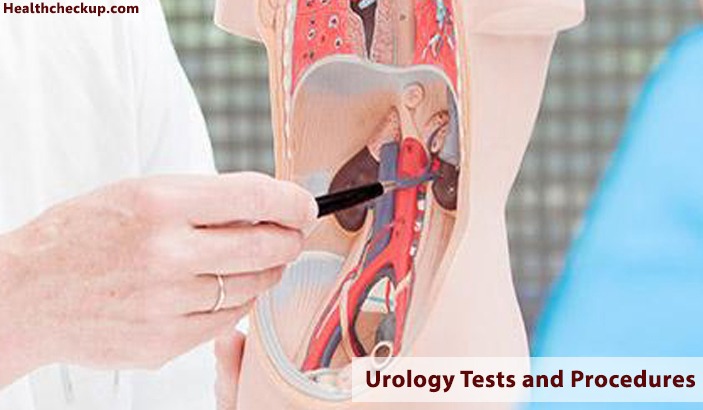Were you asked by your family physician to meet a Urologist? Well, this is the time most of us panic as we are not aware of the various urology tests and procedures involved. Before we start knowing about various Urology Tests or Check Ups and Procedures, let us first understand what Urology is all about.
What is Urology?
Urology is the branch of medical science which deals with the urinary and reproductive tract health in both men and women. The physicians who treat various diseases related to the kidneys, bladder and urethra in men and women are known as Urologists. They are specially trained in medication and surgery and they also treat cancer that occurs in urinary bladder, prostate, kidneys, and testis. Urologists also provide treatment for various sexual problems faced by men like infertility and erectile dysfunction.
What are the Various Urology Tests Performed by Urologists.
The 24 Hour Urine Collection:
This is a simple test that helps to measure the contents in urine. This test helps to check kidney functions. The test requires the patient to collect the urine in a special container given to them over the period of 24 hours. This container has to be then returned to the lab after the sample collection.
Antegrade Pyelogram:
The Antegrade Pyelogram is a test that is done to check for any blockage in the upper urinary tract. The upper urinary tract has your bladder, kidneys and the ureters. The ureters are tube like structures that carry the urine to the bladder to the kidneys. During this test, a contrast dye is placed using a needle from the flank area of one’s back by the radiologist. Then the X-ray images are used to study the movement of the contrast dye from the ureter to the kidney and then the bladder.
Circumcision:
The Circumcision is a surgical procedure where the foreskin covering the tip of the penis is removed.
CT Scan of Kidney:
CT is an imaging test where X rays and technology is used to make a detailed analysis of a part of the body. The same procedure is also used as a part of Urology procedure to study the health of the patient’s kidney.
Cryotherapy:
Cryotherapy is a procedure used for Prostate cancer. This procedure involves the cutting of cancer cells after they are frozen. Very tiny needles are used in this procedure that are placed into the tumor. Then the tumor is frozen by passing Argon gases and then is exchanged with the helium gases. This helps in causing the warming and the freezing cycle. This dead tissue then gets thawed and gets absorbed by the body naturally.
Cystography:
Cystography is another imaging test which is used to study the problems in one’s bladder. This test is done using X rays or fluoroscopy, which is more like an X ray movie.
Cystometry:
Cystometry is a test done to know the problems with the filling and the emptying of the bladder. The bladder, which is the important part of urinary tract relaxes and expands so that urine is stored. The method of Cystometry is used to study the problems with the relaxing and expansion of the bladder.
Cystoscopy:
Cystoscopy is a procedure that is performed in women, which helps the urologist to check the urinary tract, mainly the bladder and the urethra. This test helps to analyze the problems that exist in the patient’s urinary tract. This test also helps to know about any early signs of infection or cancer or even bleeding or blockage. This is one of the most performed Urology Tests in women.
Intravenous Pyelogram:
This is a test that is performed to check the health of the ureters and the kidneys. This is an imaging test.
Kidney Biopsy:
This is one procedure that is performed to remove the cells or the tissues from the body that are examined further using a microscope. This is a procedure done to check for cancer, or to check for proper functioning of the kidney.
Kidney Scan:
This is a radiology procedure that helps to study the functions and the structure of the patient’s kidneys and also about the blood flow to the tissues in the kidney.
Kidney Transplant:
This is a surgical procedure performed where a kidney is replaced with the healthy kidney received from a donor. The kidney can be donated by a living donor or can also be taken from a deceased organ donor. In most of the cases, the kidney is donated by a family member or other whose kidney is a perfect match to that of the patient. This kind of a kidney transplant is known as a living transplant. Those who donate one kidney can still lead a healthy lifestyle with one healthy kidney.
Kidney Ultrasound:
The kidney ultrasound is an imaging test which involves the use of sound waves to check the patient’s kidneys. This test can be used to check the size, the shape and also the location of the kidneys. It also helps to check for the blood flow in the kidneys.
Kidney and Bladder X Ray:
This is an X ray which is done to check for the cause of stomach ache in the patient. This also helps to check the health of the organs of the urinary system. This is one of the very first procedures done to check the health of the urinary system.
Lithotripsy:
This is one of the procedures used in the treatment of kidney stones which are large and cannot pass via the urinary tract. The procedure involves sending of ultrasound energy or at times shock waves that break the large stone into small pieces that then pass via the patient’s urinary system. This procedure helps the patient’s to avoid a surgery for kidney stones.
Prostate Biopsy:
The prostate gland is found in males only and the test of Prostate biopsy helps to study the health of the prostate gland. The prostate gland is responsible for the making of semen in men.
Radical Prostatectomy:
This is a surgical procedure that is used in the removal of the prostate gland and this also involves the removal of nearby tissues, seminal vesicles and at times some pelvic lymph nodes too are removed using this procedure.
The above mentioned are some of the urology tests and procedures. The tests advised to each patient can differ based on the health complaint they have.
Medically Reviewed By

Maanasi specializes in health topics including diet and nutrition. A mother of an untiring seven year old, she enjoys nurturing her love affair with English. She is often found nestled with a book, plopped against a dozen pillows, smiling away at the brink of finishing yet another book of the many dozens, that adorn the shelves of her Mini Library!








